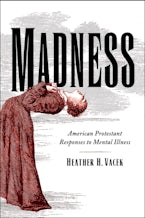Madness offers a sensitive, in-depth treatment of the important and under-discussed subject of mental illness. Heather Vacek makes a signal contribution to histories of mental illness, medicine, and religion, and her book should be of great interest to scholars in each of these fields as well as to general audiences seeking to understand and respond to mental illness.
~Candy Gunther Brown, Professor of Religious Studies, Indiana University
Vacek’s exquisitely researched and written book gives us an account of the Protestant response to mental illness from the beginning of the nation. Though this is history done at its best, Vacek’s passion for her subject makes this a book of theological significance. I heartily recommend it.
~Stanley Hauerwas, Gilbert T. Rowe Professor Emeritus of Divinity and Law, Duke Divinity School
By telling the story of mental illness, faith, and ministry through and around the lives and stories of five prominent leaders since colonial times, Madness will help us recognize eternal questions and needs as well as the historical foundations on which new collaborations between ministry and medicine can be built for the sake of more holistic care in clinics, communities, and congregations.
~Bill Gaventa, Director, Summer Institute on Theology and Disability
Vacek has written a scholarly jeremiad in which she has weighed her co-religionists' responses to mental illness in the moral balance and found them wanting. The organization of the book highlights what she persuasively argues is a perennial gap between belief and practice in her faith community...The prose is clear, the documentation thorough, and her stance heartfelt.
~Lawrence B. Goodheart, Bulletin of the History of Medicine
This timely and deeply moving study has garnered wide media attention. It shows how American Protestants have addressed and, more often, failed to address mental illness in their congregations.
~The Christian Century
I recommend this book, and especially its final chapter, to pastors and church leaders who are seeking to reflect on and develop a congregation’s ministry among people with mental illnesses, whether they be church members or strangers. It will also appeal to readers with an interest in the history of American mental health attitudes and practices, or, more generally, the history of Christian influences on American society.
~Christine Guth, Anabaptist Disabilities Network
Vacek’s book serves as an important reminder of how conceptions of mental illness and the structure of care for the mentally ill has a long and complicated history, shaped by everything from religious reformers, the emerging field of professionalized medicine, and the evolution of often grossly underfunded state institutions.
~David Eagle, Sociology of Religion
In sum, Vacek combines top-notch historical inquiry with a concern for effective theological responses to mental suffering. She carefully contextualizes the lives of her subjects in relation to broad religious and medical trends, and her in-depth biographical studies facilitate insightful, comparative analysis. The book is accessible to a broad audience and represents an excellent addition to the growing scholarly literature addressing the intersection of religion, medicine, and healing.
~Joseph Williams, Journal of the History of Medicine and Allied Sciences
Madness is a fine accomplishment, weaving together a theological point with historical analysis.
~Sean Cosgrove, Journal of Religious History
A text that will be read profitably both within the academic community and outside it.
~Jeremy Bonner, Journal of Ecclesiastical History
Vacek has written an important text for professors of pastoral counseling/clinical pastoral education and students in divinity and theological schools to disentangle church history and understand what it is they believe about the role of churches and clergy in the accompaniment of people with mental disabilities.
~Corrine C. Bertram, H-Net Reviews in the Humanities & Social Sciences
… Madness is a fascinating read and of particular interest to historians, mental healthcare practitioners, and those researching the intersection between medicine and religion.
~E. Janet Warren, Perspectives on Science and Christian Faith
We live in an era of ever more interest in religion and medicine, yet religious studies has produced remarkably few monographs on the relationship between religion and mental health. The historical breadth of Vacek’s book offers a wide-angle lens on this relationship, tracing major shifts as well as detailing turns both disturbing and promising. Aware both of the importance of history and the variety of communities such studies might reach, Vacek offers a thoughtful starting point for future scholarship and engagement.
~Philippa Koch, The Journal of Religion

